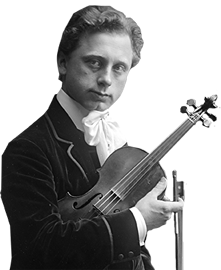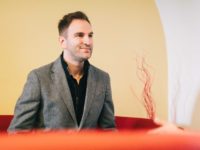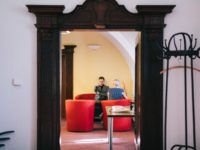You returned to Ústí after many years, how does it feel?
It’s amazing. It’s beautiful; it’s strange because a lot of things are exactly the same as I remember them. There are a lot of things that I don’t remember as well. Some things look a little smaller than they used to seem because I was so tiny that all the buildings looked huge. Now, I see the city and I feel like I see it for the first time because when you’re seven or even fifteen or sixteen, your whole life changes between then and now. You see so many people, you see so many different cities and towns and then you come back to a town like this and you really are seeing it like for the first time. And appreciate it much more, I would say.
I remember some details because when you’re in a competition, your senses are heightened; you are much more sensitive to everything. Even as a kid, there is pressure. That is why some things remain impressed forever, for example, the smell of the brochure. I think it was printed right there and there was some kind of glue or something that made the smell that will forever remind me of the competition. And then, there was a restaurant named “Domino”. I still remember this because I thought it was a very unusual name; when I was seven years old, I thought it was very cool because I also liked to play domino. Then, the square because my father said: “If you pass the first round, you may get a new toy.” So, that was my real motivation. (laughs) Toys. We would always go and buy new toys there. It is just unbelievable to be here.
When you participated in Kocian’s Violin Competition, you firstly came home with nothing, but then you brought home a huge success; what memories do you have of the competition?
The first time I came, I was six; that is very young. I remember only one thing from that very first time. As I was playing in the first round, there was a shadow because of the light and I could see my left hand dancing. I kept looking at it and it was very fascinating and kind of distracting to me. That’s all I remember.
Then, the next year, what basically happened is that we took a poster from the competition and I had it in my tiny room. I would go to bed every night and say to the poster which had Kocian printed on itself: “Next year, I’m going to win. Next year, I’m going to win you!” And that’s what happened. (laughs) From that second year, I remember the place where we stayed. The Czech radio as the first thing in the morning – that’s how my father would wake us up. He turned on the radio and when we woke up, there was always someone practicing already, no matter what time it is. 7 am? Somebody’s practicing.
When you’re in a competition, there is a tunnel vision. At least, there was for me. It is blocking out everything except what you are supposed to do. Therefore, I remember two categories. First, there is the town, the square, the restaurant. And second, the stage, just that. Not thinking too much about where I was and who was listening; it was all about playing. In a way, I remember it as a feeling of concentration and responsibility and some very nice people that are still active or were active until recently. It’s also amazing to see the same people after so many years.
You started your career very young. Did you have the support of your family?
Yes, it is thanks to my family that I started and then even continued because my father was my teacher. He was here with me. Later, I attended other international violin competitions and he was always there. Also, my mother was a pianist. It was like a family production. Definitely yes, they were supportive. You have to have that because it takes a lot of dedication, a lot of time juggling between practicing and school. If you don’t have support and a system around you, it is very hard.
Closely connected to your youth is the fact that you remain the youngest graduate of the Music Academy in Belgrade. You finished your Masters’ studies at the age of 19. Did you encounter some rivalry from your peers?
There is always an opponent somewhere. It’s kind of like a race, but it’s strange because at the same time, everybody does their own race. I didn’t find anything difficult in the school itself, but there were always some good violinists, so you always feel motivated to do better and to push yourself. In that sense, there is always some rivalry; no matter what you do and how old you are. Especially, in a field that is very intense and competitive. That really is showbusiness. We’re not talking only about classical music, but a showbusiness. It moves fast and even faster today. It is something that I grew up with – the idea that I had to push myself to the best of my abilities. The rivalry would happen or not happen, I didn’t pay specific attention to that, but I would keep my direction. I think that is a good way to do it if you can because being too competitive with other people doesn’t have to be necessarily healthy. But being competitive with yourself and pushing yourself to the limit is usually necessary to get results, a progress.
Throughout your career, you travelled through a lot of countries. Which one is your favorite so far?
The Czech Republic.
Really?
Yes. (laughs) And Ústí nad Orlicí, my favorite town. It’s true. I love the world and I think that every country has something to offer. There are wonderful people everywhere. This was my first time to spend a little more time in Prague and now some time here in Ústí and Czech people just seem very positive. I don’t know if this is just my perception. They are very open and it’s very similar to Serbia where I am from and where I grew up. A lot of things are very similar – the language, the food, even the towns look similar. I love it here.
Besides travelling to many countries, you also performed in many places including the Carnegie Hall in New York, the Kennedy Centre in Washington DC or the Suntory Hall in Tokyo. What is your favorite place to play?
Again, it depends because there are a lot of amazing halls out there. Some are modern and have unbelievable acoustics. Some are old, and it is very inspiring to play there. Last night, we played in the Smetana Hall and it is one of the most beautiful halls I’ve seen. It’s very big, but the feeling in there was incredible. It’s hard to pick a favorite hall because they all have a different taste. For us, as long as the acoustics is good, there is this feedback that we get in the hall. However, my last impression is from yesterday because it is still fresh. You know, Carnegie Hall is great, but I don’t think it’s as beautiful as the Smetana Hall, for example. There is so much culture and history here that it creates a setting; it’s also psychological. It’s not only that you’re playing in a good room for a concert, but it’s you playing in a room of history where so many great people in the history performed.
Besides the noble halls, your fans can also see you with Gorillaz on MTV. Do you personally prefer classical music or do you like the popular music more?
Well… (laughs) I can say that I prefer classical music because I am a classical musician, but I am a very non-classical classical musician in some respect because I have done many different projects along the way. One was with Gorillaz. One was with a famous guitarist from Leb i sol; he is very famous in the Balkan. I played the electric violin there. Then, a collaboration where I played tango. This is a part of my personality which is curiosity. I am just curious about different things, unexplored areas in me. It is something that I am interested in; it musically challenges me. I am also not familiar with jazz; I would like to emerge myself into this world and if I can create a collaboration of some sort, I will totally do it. Today, cross-over is very common, so I think it has to be authentic; it has to come from you and your own interest. It’s a great feeling to be on a stage with a band and the sound is so powerful that it’s moving you. But it is also an incredible feeling to be standing next to an orchestra in a hall like Smetana Hall and perform a classical piece. It is a different type of vibration. It’s like food, you cannot have one food that you like. I have some preferences; I like Japanese cuisine and Italian as well, some French, some Czech. Each one fits a different mood. It is the same with music. All of these are attractive, and they fit different types of your day or even life.
You also dedicate your life to charity, for what you go the award “Lifting Up the World with Oneness-Heart” in 2002. What does this award mean to you?
It means that you are on the right track. Ultimately, I think that the most fulfilling existence is when you do things for others. It can be very satisfying to achieve personal goals, to get personal recognition. But at the end of the day, you realize that unless you share it with others and help others, you don’t feel fulfilled. I cannot say I was lucky, more like unlucky. Basically, there were wars in the Balkan and in my country. Many of these humanitarian efforts were because of these wars. I don’t know if I would have done them if there was no such conflict, but because the need started to rise everywhere, I was the first child ambassador, at some point. That was originally supposed to be an idea when kids come from all over the Yugoslavia and they live in a village together and learn to paint, music and languages. However, after a year, a war started, so my role instead of being a symbolic ambassador became being a practical ambassador. I met with the leaders of the conflicting parties like the Serbian president Milošević at that time, the Croatian president Tuđman, the head of the United Nations, asking them to spare kids in the conflict.
From then, other things started happening, like concerts. But what are we using this art for, anyway? Yes, you can get money for your performance, but that is not really the essence. The essence is to make people happy; to come to the concert to enjoy themselves for an hour or two. If you do what you love to do anyway, and the audience get what they expected which is a good mood, a good vibration, a good performance and then maybe somebody third benefits from that, sometimes it can save lives. I don’t see a better way to be a musician than that. Otherwise, everything else can be kind of egocentric and that is not what art is about.
Apart from today’s concert, you also performed on the 25th of April in Prague. How did you enjoy playing with the Prague Symphony Orchestra? Did the concert go as you imagined it would?
It was incredible. It was my first time playing in Prague, so I felt this responsibility as well. An amazing hall, great audience; you feel like they really know music and they want to be at the concert. They follow things; they know what you’re doing. It’s both inspiring and a responsibility for the performer. The orchestra sounded great. The whole event with so many violinists, it was…hilarious. It was funny because eight violinists, that is rare. Everyone is in a different place and we play all kinds of music. It was great fun; I am grateful to Pavel for coordinating all this and initiating this idea because it takes a lot of energy and dedication to bring something from one idea to a final project. I am very happy for all of us and for him; it really was a success. I had a great time.
You have prepared a colorful repertoire for today’s concert. Could you tell me what piece, or its part is your favorite?
That’s difficult because they all make a part of a bigger picture. For example, the Bach’s Partita n.3 is sort of iconic; it is also the last he wrote out of the set “Six Sonatas and Partitas”. It’s very popular; a lot of violinists play a movement or two from that. Then, Ysaÿe is inspired directly by that partita, so you have references. Those two go together; it’s like a master and another master who paid tribute to Bach. And then, Paganini…Paganini. (laughs) It’s hard and it’s fun. Kreisler, such a unique piece by a Viennese master and a violinist. That to break the sound of Paganini a little. The last piece is again by Paganini. They all kind of have their place; it’s very difficult to pick one because as a performer you cannot have one favorite composer or a piece. That could mean that the others are not so favorite to you. Therefore, in a way, I only play the things I like; I still have the chance to play the things that I want. All of these are my favorite, that’s why it is hard to pick one tonight. I don’t want people to be waiting for that one thing thinking: “Yeah, he said this is his favorite!” (laughs) No, it’s all part of a bigger picture.
How was the cooperation with the patron of the Kocian’s Violin Competition Pavel Šporcl?
It was great; it was easy, professional. In the end, it was very successful because he contacted me more than a year and a half ago and we booked a date. We feel like we’ve known each other for a long time. He started in New York around the same time as me, so we have many mutual friends. We studied at similar and same schools at one point. There is a certain common understanding and approach. Even if we haven’t had constant contact over the years, it doesn’t matter when you talk or play together, it feels like you’ve known each other for a while. This is important – this level of comfort. That usually gives great results quickly.
Do you have any advice for the young competitors and the starting violinists all together? What do they do to achieve the successes like you?
Firstly, you need to practice like a scientist, but be able to play like a poet. I think we live in a world where playing well is the first condition for everything else. After that, you need to keep in mind the big picture of showbusiness as well. Not just that, you need to keep the picture of people around you. I’ve seen a lot of kids in different schools that can sound amazing, but sometimes they do not develop the social skills because all they do is practice. Maybe they have parents that are very intense, so they don’t develop in all areas; they develop only as violinists. But I think that today to function in a society in the classical music world, you need everything and not just the sound. That’s my advice – to keep developing as a human being as well. This advice is more for parents than for the kids because they don’t always know; they just follow the guidance of the parents. Just keep an open mind; develop in all areas and don’t restrict yourself to only practicing and trying to sound good. It is an only one element of having a career in general.






